By Mouhamadou MT Niang
President Barrow Swears He Will Be President Until Opposition Leader Ousainou Darboe Dies
GRA and Senegal Customs Administration Unite for 10th Bilateral Meeting
By Mouhamadou MT Niang
Embrace Community-Led Initiative to Revitalize Local Infrastructure: Sohm Embarks on Road Rehabilitation Project
Club Foire Celebrates Success: 35 Graduates Shine in Tailoring and Fashion Design
‘Politics in this country has been labelled as an evil thing or a game of lies’ – Imam Baba Leigh calls for the change of the dynamics of politics in The Gambia.
BY BA ALAGIE CONTEH 啊拉吉
Whether we accept or it otherwise, our planet is under a credible threat of ecological destruction, hence the duty to take proactive actions to protect it. Climate change is an existential threat to human survival and loss of biodiversity caused mainly by Greenhouse Gas (GHG) emissions into the atmosphere. The whole world has a common but differentiated to reduce carbon emissions and mitigate the impact of climate change as recognised in the Kyoto Protocol and The Paris Agreement of 2015. While developed countries have a greater degree of responsibility to reduce GHG emissions, all countries have an equal obligation to take adaptation measures to mitigate the impacts.
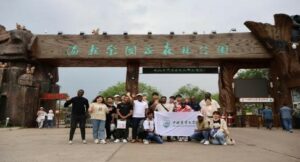 On July 15, 2024, I was fortunate to be among the few international students’ delegations invited by the College of Grassland Science and Technology at China Agriculture University to attend a summer school research program at Hulunbuir in Inner Mongolia to observe and learn about grassland restoration and practice of climate adaptation strategies employed in the region. The program included an introductory ceremony led by Professor Liang Junyi. and a tour of the Hailar National Park, marking the beginning of an extensive learning process. This report summarizes the key lessons learned and explores how The Gambia can implement similar strategies to enhance its climate resilience.
On July 15, 2024, I was fortunate to be among the few international students’ delegations invited by the College of Grassland Science and Technology at China Agriculture University to attend a summer school research program at Hulunbuir in Inner Mongolia to observe and learn about grassland restoration and practice of climate adaptation strategies employed in the region. The program included an introductory ceremony led by Professor Liang Junyi. and a tour of the Hailar National Park, marking the beginning of an extensive learning process. This report summarizes the key lessons learned and explores how The Gambia can implement similar strategies to enhance its climate resilience.
Professor Liang Junyi emphasized the critical role of grasslands in the food web. Grasslands serve as a primary production stage, providing essential resources for agriculture. They produce manure for crops, offer food for livestock, and yield grains such as corn and rice that are staples for human consumption. Additionally, grasslands play a crucial role in climate change adaptation by sequestering carbon dioxide from the atmosphere and supporting biodiversity.
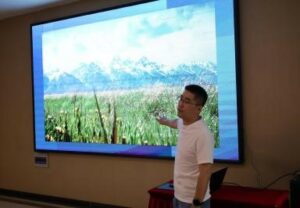
Globally, grasslands cover approximately 40% of the land area and contribute around one-third of livestock products, including dairy and meat. They also store 34% of the world’s carbon, with forests holding 80% of this stored carbon. In China, grasslands span about 3 billion hectares, accounting for 40% of the nation’s land area. Despite their significance, about 80% of China’s grasslands face degradation, primarily due to overgrazing and carbon debt—a consequence of converting grasslands and forests into settlements and other uses, which diminishes the terrestrial system’s capacity to sequester carbon. These are factors the impacts of which are not strange to Gambia.
To combat grassland degradation, the Chinese government has enacted policies and strategies aimed at preserving these vital ecosystems. These measures include restricting grazing to designated areas and reducing livestock numbers, coupled with a compensation policy for livestock owners to offset the economic impact of reduced herds. These initiatives aim to restore lost carbon by increasing and preserving grasslands, thereby enhancing their role in carbon sequestration and ecological protection.
During the visit, the students observed various agricultural practices at a Hulunbluir state farm (a company) facility situated in grasslands. The company engages in diverse agricultural activities, including crop production, livestock rearing, and grassland management, employing hundreds of workers and utilizing advanced machinery for ploughing, planting, fertilizing, and harvesting. Notably, farmers demonstrated remarkable innovation by modifying equipment to serve specific purposes.

One significant climate adaptation strategy observed was the practice of annual crop rotation. This technique, explained by the head of the facility, not only boosts productivity but also prevents soil fatigue and enhances soil fertility. Crop rotation allows farmland to recover lost nutrients, thereby maintaining soil health and ensuring sustainable agricultural productivity. Although, the practice of crop rotation is not new to Gambian farmers but with less attention to climate uncertainties, soil conditions, and precipitation levels largely due to a lack of technology and expert knowledge.
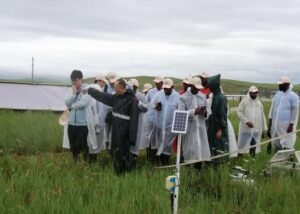 The Government of China invest huge sums of finance into research to enable scientists to investigate climate uncertainties including precipitation variability and multiple Global Change Factors (GCFs) such as temperature and biodiversity. The aforesaid experiments while inconclusive intend to examine the ecological response of grassland to precipitation variability and determine mechanisms to adapt to climate uncertainties such as flood, prolonged drought and ecological destruction. However, while the capacity of Gambia to conduct such an experiment is a pertinent consideration, what’s critical for a lesson is that the activities of farmers are mostly guided by scientific and expert instructions such as types of crop varieties to cultivate in a particular season backed by research findings.
The Government of China invest huge sums of finance into research to enable scientists to investigate climate uncertainties including precipitation variability and multiple Global Change Factors (GCFs) such as temperature and biodiversity. The aforesaid experiments while inconclusive intend to examine the ecological response of grassland to precipitation variability and determine mechanisms to adapt to climate uncertainties such as flood, prolonged drought and ecological destruction. However, while the capacity of Gambia to conduct such an experiment is a pertinent consideration, what’s critical for a lesson is that the activities of farmers are mostly guided by scientific and expert instructions such as types of crop varieties to cultivate in a particular season backed by research findings.
The delegation also visited local farmers to understand their livelihood and socio-economic activities in the grasslands. Farmers are allocated rights to over 100 hectares of grassland each with a common grazing area, where they practice rotational grazing. This method allows grass in a particular area to regenerate after being grazed, maintaining productivity and protecting the ecological environment. Farmers highlighted the economic impact of grassland degradation, noting that ecological changes such as reduced rainfall or prolonged droughts lead to lower livestock productivity and diminished economic returns. However, academic institutions and private companies venture into research to foster adaptation and grassland restoration by investigating climate-resistant and resilient species and reseeding projects.
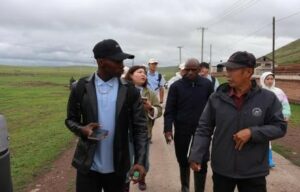
The Gambia can draw valuable lessons from Hulunbuir’s approach to grassland management and restoration. Implementing policies to restrict grazing and reduce livestock numbers in overgrazed areas, along with providing compensation to affected farmers, could help restore degraded grasslands. While the Gambia does not have typical grassland as that of China, the total soil cover, savanna grassland and forest lands are enormously vulnerable to degradation. A fact apparent to every keen Gambian observer and confirmed by scientific and research findings. Thus, reforms of laws on the land tenure system are consequential to ecological protection and climate adaptation. Additionally, promoting sustainable agricultural practices, such as crop rotation and mechanized farming, can enhance soil fertility and boost productivity.
Formulating and enforcing policies to preserve the ecosystem and support climate adaptation is crucial. The Gambia can benefit from creating economic incentives for farmers to adopt sustainable practices. This could include financial compensation for reduced livestock numbers and subsidies for implementing advanced farming techniques. Encouraging innovation among farmers, similar to the modifications observed in Hulunbuir, can also drive the development of tailored solutions for local challenges.
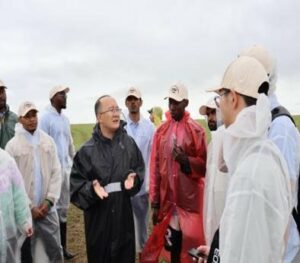 Moreover, prof. Yang Gaowen, a professor at the College of grassland science and Technology, proffers that planting trees in typical grasslands is not advisable but an invaluably significant strategy to preserve forestland and savanna grassland to prevent erosion. A tangible policy approach could be to promulgate regulations that require every region or community to preserve certain areas of land for terrestrial preservation excluding other activities except planting trees and grasses. This will enhance biodiversity and increase hydrologic circle and Carbon reduction.
Moreover, prof. Yang Gaowen, a professor at the College of grassland science and Technology, proffers that planting trees in typical grasslands is not advisable but an invaluably significant strategy to preserve forestland and savanna grassland to prevent erosion. A tangible policy approach could be to promulgate regulations that require every region or community to preserve certain areas of land for terrestrial preservation excluding other activities except planting trees and grasses. This will enhance biodiversity and increase hydrologic circle and Carbon reduction.
Engaging local communities and providing education on the importance of grasslands and sustainable practices is vital for long-term success. Training programs for farmers on crop rotation, rotational grazing, and the use of advanced machinery can enhance their capacity to adapt to climate change. Furthermore, raising awareness about the ecological and economic benefits of grassland, savanna or forestland preservation can foster community support for these initiatives.
In conclusion, the visit to Hulunbuir, Inner Mongolia, provided invaluable insights into effective climate adaptation strategies that can be applied in The Gambia. By learning from Hulunbuir’s experiences in grassland management, policy formulation, and sustainable agricultural practices, The Gambia can enhance its resilience to climate change. Implementing these strategies will require concerted efforts from the government, local communities, and stakeholders to ensure sustainable development and ecological protection for future generations.
Women’s rights activist Jaha Dukureh speaks to The Fatu Network after The Gambia Parliament voted to maintain ban on FGM/C
From Ignorance to Advocacy: Former Female Circumciser Urges Parliamentarians to Uphold FGM Ban
Hon. Almamy Gibba Says Pro-FGM Gambians Have Already Won Regardless of What Parliament Decides on Monday
“At the beginning, it was part of our culture, and despite the ban, people continue to practice it in hiding, violating the rights of women and girls,” said Hon. Madi Cessay on FGM/C.
Travel
By Sainey MK Marenah
As someone who immigrated from The Gambia, I’ve had the amazing opportunity to travel to 31 out of the 50 states in the U.S. This incredible journey has allowed me to reconnect with old friends, make new connections with strangers, and witness the diverse and fascinating ways in which people across this vast country live their lives.
Experiencing this alongside my beautiful wife, Kristina Marenah, has made the adventures even more special and meaningful.
Arizona holds a special place in my heart as one of the most memorable states I’ve visited. The awe-inspiring expansive desert landscape was unlike anything I had seen before, and observing driverless cars on the road was a truly surreal experience. Moreover, the profound presence of native land in Arizona added an enriching layer to my comprehension of American history and culture, further deepening my appreciation for this remarkable state.
During my recent travels, I was pleasantly surprised by the vibrant energy of Wisconsin and Nebraska. I had previously believed they were solely small farming communities, but during my visits, I discovered thriving and dynamic cities. These states shattered my preconceived notions and effectively highlighted the rich diversity within the United States.
During our journey, we had a powerful experience when we visited George Floyd’s memorial site in Minneapolis, Minnesota. The visit had a profound impact on both my wife and me, leaving a lasting impression. It served as a poignant reminder of the continued fight for justice and equality, and the visit was deeply meaningful for us both.
As we journeyed through these states, I was accompanied by my wonderful wife, and the experience enriched our relationship, providing us with an abundance of cherished memories. Our shared adventures served to fortify our bond and further amplify our gratitude for the rich and varied tapestry of life in America.
We still have more to explore on our journey, and by the grace of God, we are excited about visiting the rest of the states in the U.S. Every new place we visit offers us the chance to discover new things and make meaningful connections. We can’t wait to keep this adventure going together.